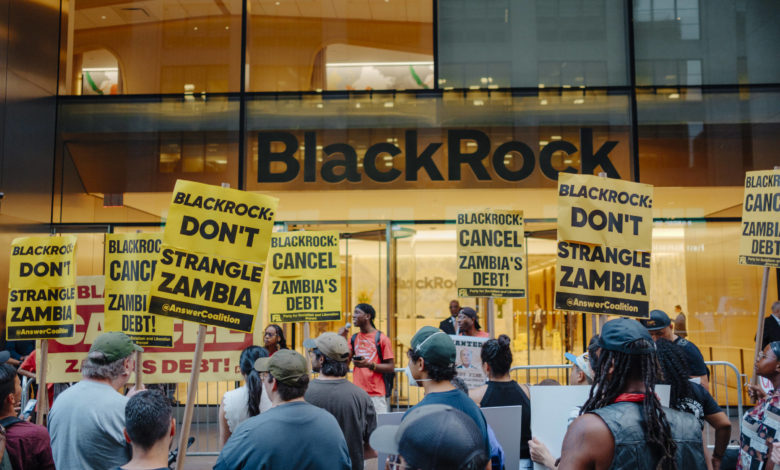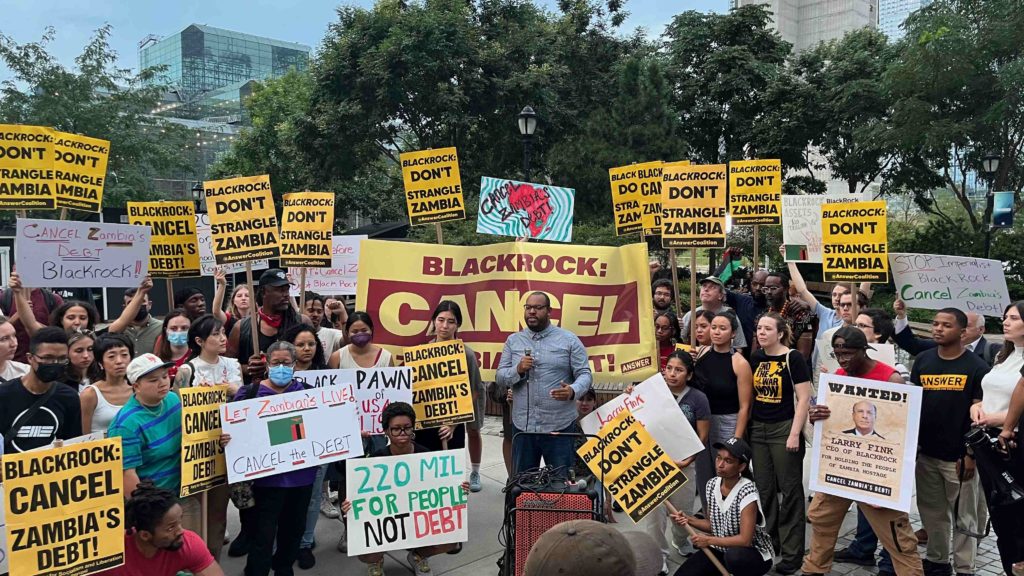
On Aug. 14, protestors in New York City held a rally to demand that BlackRock cancel its share of Zambia’s external debt.
The protestors rallied in Manhattan’s Bella Abzug Park, then marched to the BlackRock headquarters a few blocks away calling for investment management firm to “Drop the debt!” and exposing its colonial relationship with Zambia.
The rally was organized by The People’s Forum and ANSWER Coalition, and endorsed by Nodutdol, the Party for Socialism and Liberation, Sisters in the Struggle, Bridging Africa and Black Americans and more.
Profiting from misery
Holding $220 million in bonds, BlackRock is the largest private holder of Zambia’s external debt and plays a massive role in keeping Zambia underdeveloped. In its letter to BlackRock CEO Larry Fink, the United Nations Human Rights Council noted that the investment firm “bought [a] majority of the bonds since September 2020 when the country first requested for debt suspension on interest payments.”
BlackRock’s influence stretches across all industries as they own $10 trillion in various assets. It has a hand in almost all the major tech companies — Apple, Microsoft, Amazon, Google, etc. — the pharmaceutical and fossil fuel industries, and also holds major investments in companies like Pfizer and Chevron. BlackRock is also largest stakeholder in CoreCivic, the largest private prison firm in the United States. The firm even profits off of war through massive investments in Lockheed Martin, Raytheon and Northrop Grumman, some of the largest weapons and defense companies in the United States. It is clear that BlackRock, as an institution, is pivotal to the maintenance of a system that builds capital upon the suffering of the masses.
“BlackRock and other multinational companies are modern-day Dutch East India companies,” Nova Felder of Bridging Africa and Black Americans stated at the rally. “Its CEO Larry Fink is a modern-day Christopher Columbus, a colonialist with an eye on the next territory to conquer for its investors and its board, owning the largest shares in many of the world’s largest companies, companies that are making record profits at this very moment.”
Fink himself is a billionaire, and the other major shareholders of BlackRock take home multi-million dollar salaries in addition to their lucrative holdings in the stock itself.
Debt as an arm of colonialism
For centuries, Africa has been looted and robbed of its resources and labor and exploited to the highest degree. It was these African resources which built the vast wealth of Europe and the United States. In the post-colonial period, multilateral institutions such as the International Monetary Fund and the World Bank have stepped in, offering loans conditional upon vicious imposed austerity, structural adjustment and the dismantling of labor and trade regulations to invite foreign capital investment.
One-fifth of African nations spend 20% of their government revenue to pay off externally owned debts and the interest accrued on them. Zambia specifically serviced a staggering 50% towards external debt in 2021.
On average, as of the end of 2021, external debt as a share of GDP was near 60% for African countries, with 10 nations exceeding 75% including Zambia, Rwanda and Angola. This means for Africa as a whole, debt is more than 50% of the entire continent’s GDP.
As of today, more than 30 African countries spend more on servicing debt than their health services, with Zambia spending more servicing debt than both their health and education services combined. This is a key reason why more than 61% of Zambians live under the poverty line, a rate that is 20% higher than the rest of Sub-Saharan Africa.
In Zambia specifically, 18% of its debt is owed to multilateral institutions such as the IMF and World Bank, while 46% of its debt is owed to private lenders such as BlackRock. According to Debt Jubilee Campaign estimates, the investment firm stands to make 110% profit from this debt.

Cancel the debt!
So who really is owed a debt? In front of the BlackRock offices, Eugene Puryear of ANSWER Coalition remarked that canceling Zambia’s debt is “part and parcel of the reparations that are due for African people for 500 years of colonialism and slavery.”
According to Puryear, it is not about what Zambia owes BlackRock, “it’s about what they [Blackrock] owe.” It’s about what their ancestors owe. It’s about what every institution in the country from insurance, to the top universities, to the top banks, all of them rooted, grounded, in slavery. So they owe money.”
Puryear’s comments mirrored those of Thomas Sankara when he addressed the summit of the Organization for African Unity in 1987. There, the revolutionary and first president of Burkina Faso asserted, “Debt’s origins come from colonialism’s origins. Those who lend us money are those who colonized us … We cannot repay but the others owe us what the greatest wealth could never repay, that is blood debt.”





